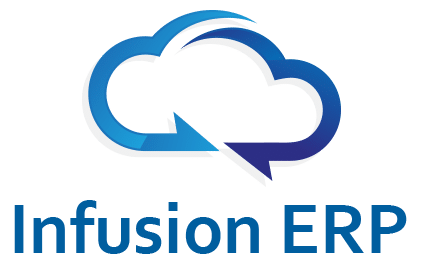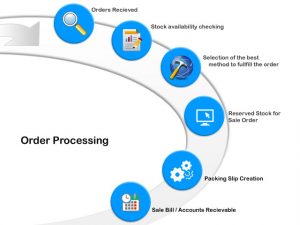21/06/2022
A sales order is a formal agreement between a business and the party being sold about the delivery of goods or the provision of services. It specifies pricing, item amounts, and delivery dates. Every sales order that is delivered on time shows you as a reliable brand in the marketplace. When the volume of sales orders starts to rise, typical business applications struggle to keep up with the demand. Customers want you to deliver things on schedule, and that is your basic job. Aside from that, the order fulfillment process should be seamless, making dealing with you an exciting experience for customers. A well-organized order management process reflects your operating efficiency, reduces inventory, and saves time and money. All of this is feasible with the adoption of an ERP system as ERP for Order Processing is one of the best solutions.
The Role of ERP for Order Processing:
A good ERP for order processing is best choice because it can help you retain existing clients while also expanding your business by automating order capture and improving customer experience. ERP enables businesses to automate orders, sales, customer support, finance and accounting, supply chain, fulfillment, and cash delivery at every level.
Here are three ways ERP systems enable this:
It Automates Order Capturing process
As consumers grow more web-savvy, there has been a significant transition away from traditional in-person, phone, fax, and email sales channels to tech-enabled sales channels. Comprehensive automation possibilities are enabled by a good ERP system. It eliminates the problems associated with traditional sales order processing, such as manual data entry, manual paper routing, a lack of coordination, and a lack of transparency.
It Speeds up the process of Order Fulfillment!
An efficient, cloud-based ERP keeps sales, customer support, financial, and fulfillment data in one place, accessible to all teams in real-time. Order automation makes it easier to transfer orders quickly through the virtual value chain and meet customer expectations for quick delivery.
It Improves Customer Experience!
There is no alternative for outstanding customer service in a world where customers have a plethora of options. Customers today are impatient, therefore a long response time is not only unacceptable, but it may also lead to order cancellation and have a negative influence on the company. Organizations can save time and re-direct experienced people to more sophisticated, specialist work areas by automating the whole value chain, including frontline service.
Other key benefits include!
- Order entry is automated
- Real-time information access
- Real-time transactional data availability
- A duplicate order checker that is automated
- In-depth examination of all order management processes
How does ERP software promote efficiency?
ERP, when implemented properly, maybe a game-changer for your business. Here are a few ways ERP can help you save time and money.
ERP that is cost-effective cuts operational costs dramatically. You don’t have to worry about managing multiple data sources because everything is saved in a central database.
It provides integrated management!
In the sales order processing procedure, having real-time information from several departments is critical. ERP takes it a step further by allowing users to view this data at any time. Workers’ accuracy and productivity improve as a result of this type of integration.
It provides improved decision-making!
As they have the relevant information, executives and managers can make better judgments about supply chain stakeholders. Customer input assists them in determining which departments are working well and which need to be improved.
A one-size-fits-all ERP system will not provide you with the aforesaid advantages. An integrated ERP system with built-in sale processing, on the other hand, will ensure a smooth transition from initial sale to delivery.
When a consumer places an order, all departments are notified so that they can collaborate on the purchase’s fulfillment. They can track order progress and schedule their tasks thanks to automation and integration. The sales staff creates the order’s specifics, which are needed in production, packaging, and shipping. Finally, just before the order is shipped, an automated invoice can be prepared that includes taxes and freight charges.
Conclusion:
So By replacing manual processes with a fully automated software solution, ERP for Order Processing is a great option because ERP management software can give you a competitive advantage. It streamlines all of your customer-facing processes and allows your employees to handle orders more quickly. Customers can get up-to-date information on the status of their orders. Customers want real-time updates and help while their orders are in route and after they have been delivered.
Customer experience, cash flow, and data accuracy are all improved by ERP software and Customer Order Management connectivity. It not only allows you to maintain track of customer orders from the first generation to shipment, but it also allows customers to keep track of their own orders.
Infusion ERP provides great client order management and sales force automation systems. Customer Order Management ERP software is created by integrating data from an organization’s orders, inventory, and warehouse in order to expedite the shipment and fulfillment of orders.
You can also benefit from it by using these automated and efficient solutions in order to replace your old and time-consuming methods.
Recent Posts
Recent Comments
- Mark on ERP Software
Categories
Completely synergize resource is taxing relationships via premier are man niche markets. Professionally cultivate one to one customer.



